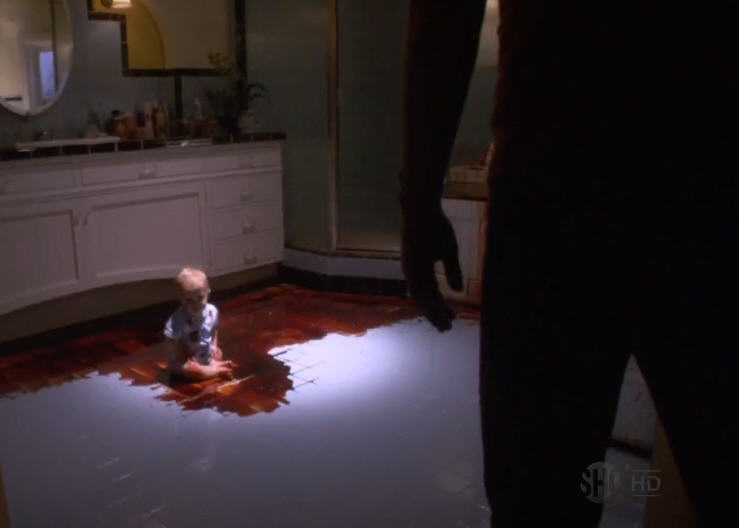
Blood sets Dexter Morgan’s teeth on edge, but the season four finale of “Dexter” has enough twists and turns to pump your blood with enough adrenaline for you to not notice you’ve chewed your nails off till its shocking conclusion. Showtime Channel’s Emmy nominated “Dexter”, based on the Jeff Lindsey novel “Darkly Dreaming Dexter,” started in syndication in the fall of 2006. Serial killer Dexter Morgan (Michael C. Hall) is a Miami PD Blood Spatter analyst by day and vigilante serial killer by night.

The series began with Dexter as a cold, solitary, and emotionless monster and by the start of this season he has come to learn he does feel emotion and starts a family, while quenching his need to kill. The main storyline of the episode has Dexter tying up all the loose ends with the Trinity Killer (John Lithgow) in an intense game of cat-and-mouse. Trinity has discovered Dexter’s ruse with him and plans to flee town after a killing spree that has evaded the Miami P.D. for decades.
The story for the episode takes the relationship the season has built so far between these two killers and relentlessly throws curve balls as you watch both of these calculating serial killers throw each other off their game as they up the stakes on each other. Trinity comes to the Dexter’s station and threatens him to leave him alone. Dexter chases and incapacitates Trinity only for Trinity to escape later when Dexter is arrested for fleeing the scene of a car crash during the pursuit. The script throws both of these characters into a chase that brings the world crashing down on each other. They both are putting each other at risk of losing everything. Dexter’s pursuit is putting Trinity at risk of being discovered after evading justice for 30 years and Trinity’s pursuit puts our hero at risk of losing his new family and revealing his killing tendencies to the world. All bets are off by the start of this episode. The tension and the stakes have never been higher and it keeps you on edge.



The series began with Dexter as a cold, solitary, and emotionless monster and by the start of this season he has come to learn he does feel emotion and starts a family, while quenching his need to kill. The main storyline of the episode has Dexter tying up all the loose ends with the Trinity Killer (John Lithgow) in an intense game of cat-and-mouse. Trinity has discovered Dexter’s ruse with him and plans to flee town after a killing spree that has evaded the Miami P.D. for decades.
The story for the episode takes the relationship the season has built so far between these two killers and relentlessly throws curve balls as you watch both of these calculating serial killers throw each other off their game as they up the stakes on each other. Trinity comes to the Dexter’s station and threatens him to leave him alone. Dexter chases and incapacitates Trinity only for Trinity to escape later when Dexter is arrested for fleeing the scene of a car crash during the pursuit. The script throws both of these characters into a chase that brings the world crashing down on each other. They both are putting each other at risk of losing everything. Dexter’s pursuit is putting Trinity at risk of being discovered after evading justice for 30 years and Trinity’s pursuit puts our hero at risk of losing his new family and revealing his killing tendencies to the world. All bets are off by the start of this episode. The tension and the stakes have never been higher and it keeps you on edge.

Hall’s brilliant portrayal of a vigilante serial killer walks the line between dark comedy and creepy as he tries to overcome his “dark passenger” for the sake of keepin his new family. Hall is at his A-game with his performance in this episode as you watch him slowly break down and get more emotional than he’s ever been on the show. A Great performance by Hall, but the standout performance is the chilling one by Lithgow as Trinity. Lithgow is the best antagonist this show has had by a long shot. Lithgow, better known as for his comedic role as High Commander Dick Salmon in “Third Rock From the Sun,” delivers the performance of his career with his role. Trinity’s arc is layered as the audience sees he is far worse killer than Dexter could ever want to be.

The conclusion between these two reach a sympathetic note, only to lead to a reveal that will go down as one of the most shocking endings for a season finale in television with the Death of Dexter’s wife. The script ends on a melancholy mood dying for the next season because of the possibilities the show opens itself with the loss of a character as important to our hero’s humane-side for the past four seasons as Rita Morgan (Julie Benz) has been. The ending is indicative of the risks the show is willing to take to avoid staleness and repetition. You can’t help but applaud the writers for giving the fourth season such a memorable finish. Overall, the show has reached a new realm with how well each episode has built up to this climatic and exciting conclusion. It’s going to be extremely difficult for the show to top itself next season as it has done each year. This season is nothing short of masterful in making the audience emotionally connected to where the characters have gotten to, but also terrified and excited for where they are all going.

